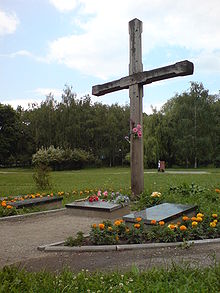- Olena Teliha
-
Olena Teliha
Олена Теліга
Born July 21, 1906
 Ilyinskoe (near Moscow), Russia
Ilyinskoe (near Moscow), RussiaDied February 21, 1942 (aged 35)
 Kiev, Ukrainian SSR
Kiev, Ukrainian SSROccupation Poet and writer Nationality Ukrainian Olena Ivanivna Teliha (Ukrainian: Олена Іванівна Теліга, July 21, 1906 - February 21, 1942) was a Ukrainian poet and Ukrainian activist of Ukrainian and Belarusian ethnicity.
Contents
Biography
Olena Teliha was born Elena Ivanovna Shovgeneva (Russian: Елена Ивановна Шовгенева) in the village of Ilyinskoe, near Moscow in Russia where her parents spent summer vacations. There are a several villages by this name in that area, and it is unknown exactly which one of them is Olena Teliha's birthplace.[1] Her father was a civil engineer while her mother came from a family of Russian Orthodox priests. In 1918, she moved to Kiev with her family, when her father became a minister in the new UNR government.[2] There they lived through the years of Ukrainian Civil War. When the Bolsheviks took over, her father moved to Czechoslovakia, and the rest of the family followed him in 1923.[1] After living through the rise and fall of Ukrainian National Republic, Olena took an avid interest in Ukrainian language and literature. In Prague, she attended a Ukrainian teacher's college where she studied history and philology. She met a group of young Ukrainian poets in Prague and started writing poetry herself. After marrying, she moved to Warsaw, Poland, where she lived until the start of the Second World War. In 1939, like many of the young Ukrainians with whom she associated, Olena Teliha became a member of the Organization of Ukrainian Nationalists, within which she became an activist in cultural and educational matters.[3]
Fingers breaking – long and slender, To tear up habits like old cats, To take up weapons from your hand And strike hard where a hard strike is needed.
In 1941, Teliha and her husband Mykhailo Teliha (whom she met and married in Czechoslovakia[2]) moved back to Kiev,[3] where she expanded her work as a cultural and literary activist, heading the Ukrainian Writers' Guild and editing a weekly cultural and arts newspaper "Litavry". A lot of her activities were in open defiance of the Nazi authorities. She watched her closest colleagues from the parent-newspaper "Ukrainian Word" ("Ukrayins'ke Slovo") get arrested and yet chose to ignore the dangers. She refused to flee, declaring that she would never again go into exile.[2]
She was finally arrested by the Gestapo and executed, aged 35, in Babi Yar in Kiev[1] along with her husband.[3] In the prison cell where she stayed, her last written words were scribbled on the wall: "Here was interred and from here goes to her death Olena Teliha".
Remembrance
On July 19, 2007 the National bank of Ukraine issued a commemorative coin dedicated to Olena Teliha.[4]
See also
- List of Ukrainians
- Culture of Ukraine
- Ukrainian literature
References
- ^ a b c Ukrainian poet-heroine Olena Teliha, 1906 - 1942, Brama (Jul 20, 2006)
- ^ a b c d Life is not to be sold for a few pieces of silver - The life of Olena Teliha by Ludmyla Yurchenko, CYM, the Ukrainian Youth Association
- ^ a b c 1942: Mykhailo and Olena Teliha, Ukrainian artists, ExecutedToday.com
- ^ Jubilee Coin "Olena Teliha", National bank of Ukraine
External links
- Olena Teliha's poems. (Ukrainian)
- Life is not to be sold for a few pieces of silver - The life of Olena Teliha, CYM, the Ukrainian Youth Association
Categories:- 1906 births
- 1942 deaths
- People from Moscow Oblast
- Ukrainian poets
- Ukrainian murder victims
- Ukrainian people of Belarusian descent
- Organization of Ukrainian Nationalists
- Ukrainian women in politics
- People murdered in the Soviet Union
- People killed by Nazi Germany
- Ukrainian nationalism
Wikimedia Foundation. 2010.

